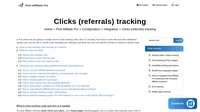What is a Tracking Method?
Tracking methods in affiliate marketing are sophisticated techniques designed to monitor and record user interactions, sales, clicks, and other engagement metrics occurring through affiliate links. These methods are critical for determining the efficacy of affiliate marketing strategies and ensuring affiliates receive appropriate compensation for driving sales or generating leads. Tracking methods vary widely, encompassing cookies, pixels, server-to-server communications, and more, each offering distinct capabilities and limitations. In recent years, the evolution of affiliate tracking software has streamlined the tracking process, making it more reliable and efficient.
Key Tracking Methods
Cookie Tracking
- Definition: Cookie tracking is among the most prevalent methods in affiliate marketing. It involves placing a small data file, known as a cookie, on a user’s browser upon clicking an affiliate link. This cookie stores essential information about the user’s interaction, such as the time of click and affiliate ID, facilitating the attribution of sales or actions back to the affiliate.
- Pros: Easy to implement and widely supported across numerous platforms.
- Cons: Cookies can be deleted by users or blocked by browser privacy settings, leading to potential tracking data loss.

Pixel Tracking
- Definition: This method employs a small graphic image or pixel embedded in a webpage to track user interactions and report data back to the affiliate tracking platform. It is commonly used to confirm conversions or sales.
- Pros: Effective for tracking across multiple channels, including emails.
- Cons: May be less effective on mobile devices or when users disable image loading.
Server-to-Server Tracking (S2S)
- Definition: Also known as postback URL tracking, this method involves direct communication between servers to track conversions without relying on the user’s browser data.
- Pros: More secure and reliable as it’s unaffected by browser settings or ad blockers.
- Cons: Requires more technical setup and integration between the merchant’s and affiliate’s systems.
API Tracking
- Definition: Utilizes an Application Programming Interface (API) for real-time data exchange between systems, enabling precise tracking of clicks, conversions, and commissions.
- Pros: Provides seamless integration and real-time data exchange.
- Cons: Dependent on the compatibility of APIs across different systems.
Manual Tracking
- Definition: Involves manually correlating sales or leads with affiliate activities, often through unique codes or links used by affiliates to drive traffic.
- Pros: Direct and straightforward for small-scale operations.
- Cons: Labor-intensive and prone to human error.
Importance of Tracking Methods
The choice of tracking method can significantly impact the accuracy of affiliate marketing programs. Robust tracking ensures affiliates are duly credited for their contributions, supports fraud prevention, and provides valuable data for optimizing marketing strategies. Some key benefits include:
- Performance Measurement: Enables businesses to evaluate the effectiveness of their affiliate partners and optimize programs accordingly.
- Commission Attribution: Ensures precise allocation of commissions based on tracked activities, reducing disputes and enhancing trust.
- Fraud Prevention: Assists in detecting and mitigating fraudulent activities, protecting both the brand and affiliates.
- Regulatory Compliance: Ensures tracking practices adhere to privacy laws such as GDPR and CCPA, safeguarding user data and maintaining compliance.
Challenges and Considerations
Evolving privacy laws and browser policies pose challenges to tracking methods. The deprecation of third-party cookies necessitates a shift to more privacy-compliant methods like first-party cookies or server-to-server tracking. Additionally, the use of ad blockers and privacy settings can impair traditional tracking methods, prompting the need for innovative solutions that respect user privacy while maintaining effective tracking capabilities.
Optimizing Tracking Strategies
To maximize the benefits of affiliate tracking, businesses should consider the following strategies:
Data-Driven Decisions: Use insights gained from tracking data to refine marketing strategies and improve overall program performance.
Leverage Modern Software: Utilize affiliate tracking platforms that offer comprehensive solutions with multiple tracking options and robust analytics.
Regular Testing and Updates: Continuously test tracking links and methods to ensure accuracy and compliance with current regulations.
Transparent Communication: Maintain open communication with affiliates about tracking practices and commission structures to build trust and loyalty.
Frequently Asked Questions
Which tracking method is better?
The best tracking method is the one that best suits your needs. Some of the most common are browser cookie tracking, HTML5 cookie tracking, flash cookie tracking and IP address tracking.
What is a tracking link in affiliate marketing?
A tracking link is a special URL that contains a code that tracks where a click came from. This code is used to attribute sales and commissions to the correct affiliate.
The leader in Affiliate software
Post Affiliate Pro offers a comprehensive affiliate software platform to manage multiple affiliate programs with ease. Enjoy no setup fees, 24/7 customer support, and a free 1-month trial. Ideal for small and large businesses, it features precise tracking, automated workflows, and customizable tools to boost your affiliate marketing success. Try it now and streamline your affiliate operations effortlessly!
A guide to different types of affiliate tracking
Explore the comprehensive guide on affiliate tracking methods like cookie, postback URL, and IP tracking to optimize your affiliate marketing strategy. Learn how Post Affiliate Pro's advanced software ensures precise tracking, maximizes sales, and provides exceptional support for seamless affiliate cooperation. Unlock your brand's potential with cutting-edge tracking solutions today!
Discover the essential role of affiliate software in managing and optimizing your affiliate marketing programs. Learn how it streamlines link tracking, referral management, and commission payments, ensuring data security and fraud prevention. Unlock growth opportunities with efficient program management and boost your business's reach and ROI. Visit now to explore the benefits of investing in affiliate software!
How to choose affiliate software
Discover how to choose the best affiliate software with Post Affiliate Pro's comprehensive guide. Learn about essential features like tracking, fraud prevention, and customizable commission types, all designed to optimize your affiliate programs. Ensure seamless operations with easy setup, mobile access, and outstanding support to save time and build trust with affiliates. Visit our guide to make informed decisions and boost your affiliate marketing success!
Discover the essentials of clicks (referrals) tracking with our comprehensive guide. Learn about the importance of click tracking code, explore various code examples including simple, asynchronous, and PHP versions, and dive into advanced tracking options. Optimize your affiliate marketing strategy with expert tips on setting account IDs, managing cookies, and customizing tracking parameters. Visit now to enhance your click tracking implementation!










